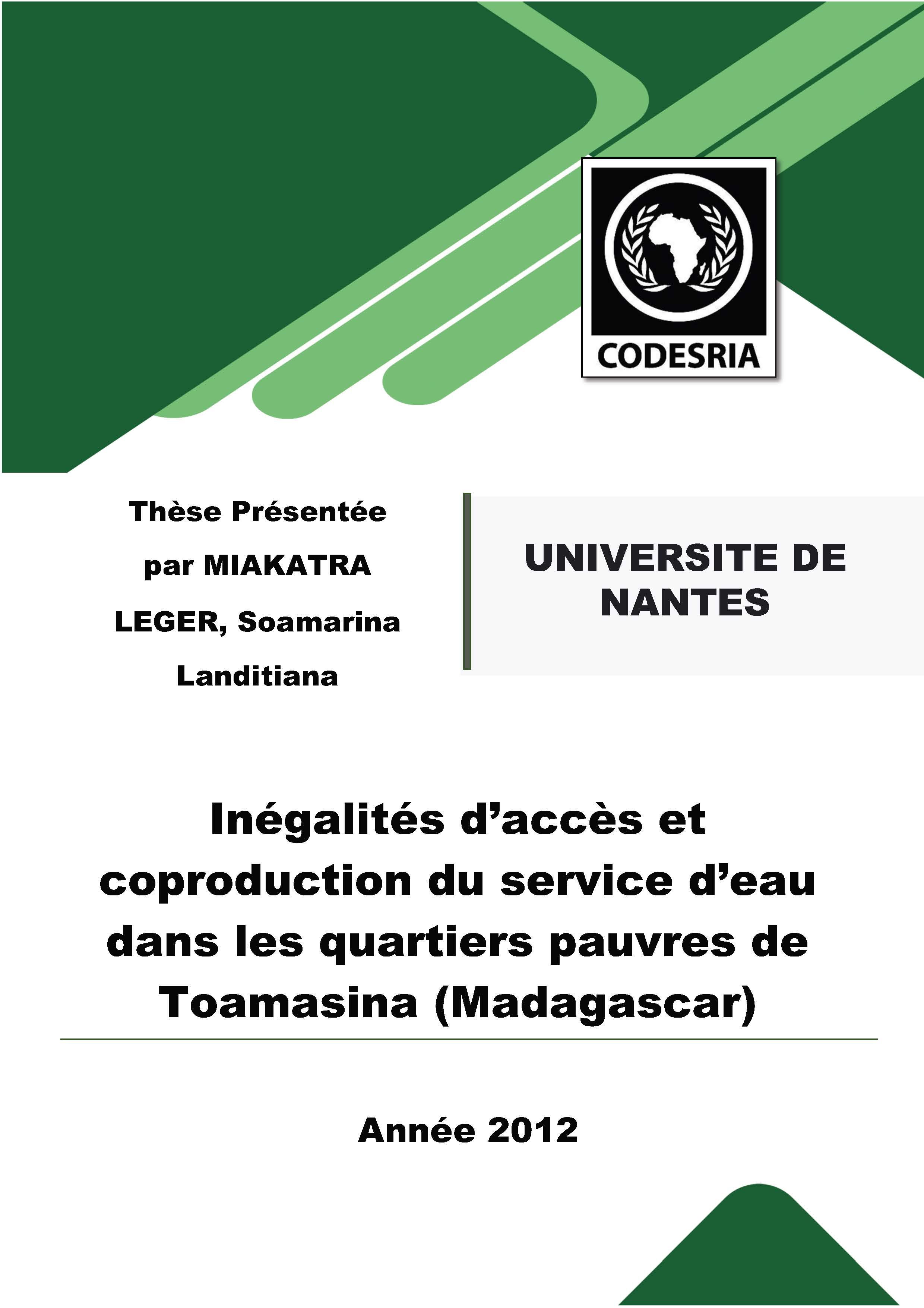Inégalités d’accès et coproduction du service d’eau dans les quartiers pauvres de Toamasina (Madagascar)
Keywords:
unequal access, water supply, water reforms, coproduction, Toamasina, MadagascarSynopsis
In Toamasina (Madagascar), the public network of drinking water supplies only a minority of the population, either by private connections or by collective water taps. Several districts of the city lack basic infrastructures of distribution and their inhabitants draw underground water from wells or buy water from informal merchants. Since a few years, the Malagasy government has adopted a new water policy that relies on institutional reforms and the direct participation of the population in the delivery of water, notably in the poor urban districts. These reforms call for thorough analysis of the changing patterns of access to drinking water, particularly those that mobilize people around co-production arrangements. These last ones have modified the relationship between water supply, urbanized areas and local actors. The thesis analyzes the effects of these evolutions in the poor neighborhoods of Toamasina.
Downloads
References
ABDOU M, 2007. Les lavoirs publics et leurs impacts : cas de la commune urbaine de Toamasina. Mémoire de maîtrise en développement social. 122 p.
AFD (Agence Française pour le Développement), PS Eau, La prise en compte du genre dans les projets d’alimentation en eau potable et d’assainissement. Guide méthodologique. 40 p.
AFD, 2010. Les petits opérateurs privés de la distribution d’eau à Maputo. Document de travail n° 85. 54 p.
AITEC (Association Internationale des Techniciens, Experts et Chercheurs), 2003. L’égalité d’accès aux services publics, une alternative au néo-libéralisme. Définitions, approches théoriques. www.reseau-ipam.org 15 p.
ALLEN A, DAVILA J, HOFMANN P, 2006. Governance of water and sanitation services for the peri-urban poor. A framework for understanding and action in metropolitan regions. The Development Planing Uni. University College London. 125 p.
ANS (Action Nord Sud), FAM (Fikambanan‟Ambohijafy Mifarimbona), HI (Handicap International), 1999. Construction et réaménagement des lavoirs publics d’Ambohijafy parcelles 14/31 et 14/32. Dossier socio-économique. 46 p.
ARSAC A, PELLETIER P, 1962. Ville de Toamasina. Enquête urbaine, socioéconomique et programme d’habitat. 146 p.
ASINOME E, 2006. S’approvisionner en eau potable dans les villes du sud. Les quartiers défavorisés d’Antananarivo, Madagascar. Mémoire de master LATTS, Université Paris 8.107 p.
ASSOGBA Y, 2000. Gouvernance, économie sociale et développement durable en Afrique. Cahiers du CRISES. Collection Etudes Théoriques. 29 p.
ATLANI-DUAULT L, 2005. Les ONG à l‟heure de la « bonne gouvernance ». in Autrepart, Revue de sciences sociales au Sud n°35. Les ONG à l‟heure de la « bonne gouvernance ». Armand Colin/IRD Editions. pp 3-17.
Banque Mondiale, 2002. Le partenariat Madagascar-Banque Mondiale 2001-2002. 98 p.
Banque Mondiale, 2005. Renforcer la collaboration entre la Banque Mondiale et les organisations de la société civile : enjeux et options. 76 p.
BARON C, ISLA A, 2004a. Développement durable et gouvernance : quelles valeurs communes pour un modèle d’accessibilité à l’eau potable dans les villes d’Afrique subsaharienne ? Université de Toulouse 1. 13 p.






